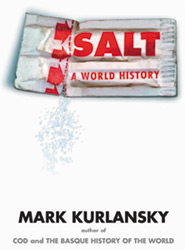Salt: A World History
Air Date: Week of March 15, 2002
In the tradition of the mundane, Mark Kurlansky, author of Cod: A Biography of the Fish that Changed the World, has now revealed empires, philosophies and traditions revolving around the common table salt. Bruce Barcott reviews Kurlansky's latest book Salt: A World History.
Transcript
CURWOOD: These days, it seasons your popcorn, home fries and hamburgers. But in days gone by it was at the center of ancient trading empires. In homage to the humble table condiment, author Mark Kurlansky has written a book about the centuries old saga of what Homer called "the divine substance." Bruce Barcott has this review of "Salt: A World History."
BARCOTT: Salt, the killer white. Wars were fought for it, empires flourished around it, and now Mark Kurlansky has written the history of the world based upon it. Kurlansky is the author of "Cod: A Biography of the Fish that Changed the World." That brilliant little history helped spark the craze for what's called "mundane studies," which view history through the development of ordinary things like the pencil or the color mauve.
In his new book Salt, Kurlansky offers a brief history of the world as told through sodium chloride. The Egyptians salt-cured meat with evaporated seawater from the Nile Delta. Salt was at the center of a great Venetian trading empire. "Salt is so common," Kurlansky writes, "that we have forgotten that from the beginning of civilization until about a hundred years ago salt was one of the most sought after commodities in human history."
 (Courtesy of Walker & Co.)
(Courtesy of Walker & Co.)Kurlansky is a master of the historical anecdote and he packs the book with delicious tidbits. Did you know that French women salted their husbands to make him fertile or that Celtic salt miners bleached their dreadlocks in lime? Or that in 1795 the Onondaga tribe traded its 10,000 acre reservation to the state of New York for a yearly payment of 750 pounds of salt, which the state still delivers? As entertaining as these factoids are, Kurlansky often fails to give any larger meaning to them. It's as if he's trying to convince us of nothing more than the fact that salt throughout the world has been pretty darn important.
He also falls victim to what might be called the sun king fallacy: believing the world revolves around his particular subject. I'm willing to believe that empires rose and fell around salt. But when he writes that, quote, "The history of the Americas is one of constant warfare over salt," end quote, that's pushing it. I can make a pretty fair case for tobacco, cotton and slavery, as well. What I love most about Salt, the book, are the details about our strangely intimate relationship with the stuff. The Romans called a man in love "salax": in a salted state. A princess in a French folk tale swears to her father, "I love you like salt."
Kurlansky writes that this odd association could arise from the fact that salt is an essential component of blood, sweat, and tears. Take away the water and we're as salty as Lot's wife. Still, I wish that Kurlansky had gone further in conveying the experience of salt - what 18th century French sauerkraut tasted like or a little bit more about what it's like to float in the bitterly salty Dead Sea. Perhaps Kurlansky will tackle the more sensual aspect of his subject in a worthy sequel: "The World History of Sugar."
[MUSIC: Pan American, "Tract," PAN AMERICAN (Kranky - 1997)]
CURWOOD: Bruce Barcott writes about environmental issues for Outside Magazine.
[MUSIC OUT]
Links
Living on Earth wants to hear from you!
Living on Earth
62 Calef Highway, Suite 212
Lee, NH 03861
Telephone: 617-287-4121
E-mail: comments@loe.org
Newsletter [Click here]
Donate to Living on Earth!
Living on Earth is an independent media program and relies entirely on contributions from listeners and institutions supporting public service. Please donate now to preserve an independent environmental voice.
NewsletterLiving on Earth offers a weekly delivery of the show's rundown to your mailbox. Sign up for our newsletter today!
 Sailors For The Sea: Be the change you want to sea.
Sailors For The Sea: Be the change you want to sea.
 The Grantham Foundation for the Protection of the Environment: Committed to protecting and improving the health of the global environment.
The Grantham Foundation for the Protection of the Environment: Committed to protecting and improving the health of the global environment.
 Contribute to Living on Earth and receive, as our gift to you, an archival print of one of Mark Seth Lender's extraordinary wildlife photographs. Follow the link to see Mark's current collection of photographs.
Contribute to Living on Earth and receive, as our gift to you, an archival print of one of Mark Seth Lender's extraordinary wildlife photographs. Follow the link to see Mark's current collection of photographs.
 Buy a signed copy of Mark Seth Lender's book Smeagull the Seagull & support Living on Earth
Buy a signed copy of Mark Seth Lender's book Smeagull the Seagull & support Living on Earth

